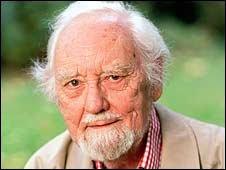Tributes paid to Archers veteran Norman Painting
- Published

Painting was also a scriptwriter on the Βι¶ΉΤΌΕΔ programme
Actors and broadcasters have gathered to pay tribute to the late Norman Painting, best known for playing Phil Archer in Βι¶ΉΤΌΕΔ Radio 4's The Archers.
Painting, who died aged 85 last year, had played the Ambridge farmer since the show's trial run in 1950.
A service of thanksgiving for the Leamington Spa-born actor was held at St Martin-in-the-Fields in London's Trafalgar Square.
Actor and presenter Stephen Fry and ex-Prime Minister John Major attended.
'Versatile broadcaster'
Another former Conservative leader Michael Howard was also in the congregation.
Cast members and other friends and colleagues attended the service.
Among those who read or gave a tribute were Fry, Ysanne Churchman Pilgrim, who played Grace Archer in the 1950s, and Vanessa Whitburn, editor of The Archers.
Patricia Greene (Jill Archer), Trevor Harrison (Eddie Grundy), Alison Dowling (Elizabeth Pargetter) and Tim Bentinck (David Archer) were also among those who contributed.
Painting's last scenes were recorded just two days before he died in October.
He was also a scriptwriter on the Βι¶ΉΤΌΕΔ programme from 1966 to 1982 and wrote 1,198 scripts.
Bladder cancer
In latter years his appearances on The Archers became more limited as he suffered poor health, including a heart condition.
Painting, who lived in Oxfordshire, was diagnosed with bladder cancer several years ago, but said it would not stop him doing "what I love".
He was appointed an OBE in the 1970s and penned an autobiography titled Reluctant Archer.
One of his most hard-hitting storylines was when Grace, Phil's first wife, died in a barn fire in 1955, though in recent years the farmer enjoyed a peaceful retirement.
When Painting's death was announced, Mark Thompson, Βι¶ΉΤΌΕΔ director general, said he was "deeply saddened".
Mr Thompson said Painting chose to leave a promising career in academia at Oxford to devote 60 years to Βι¶ΉΤΌΕΔ audiences, who regarded him as a "friend".